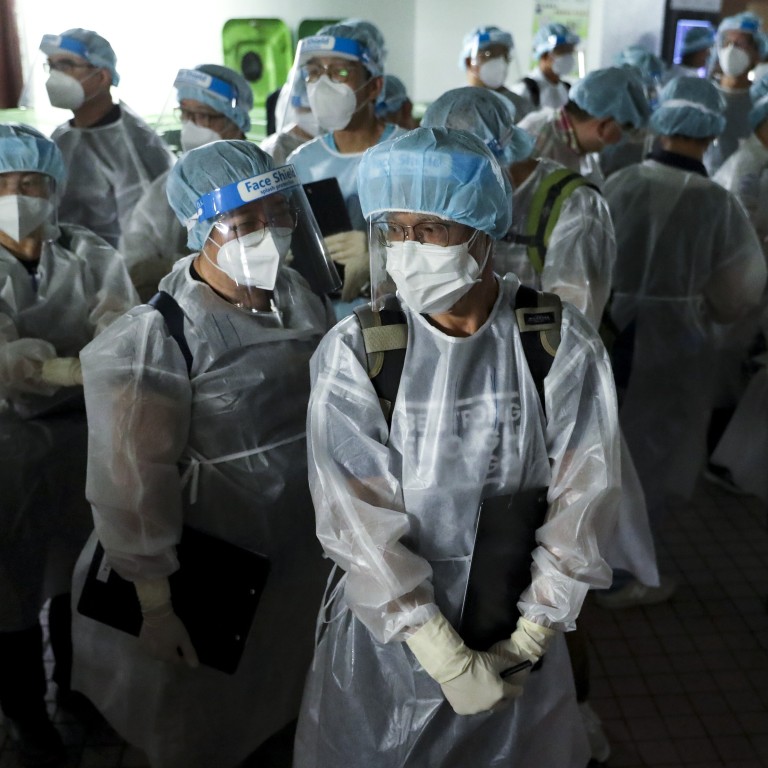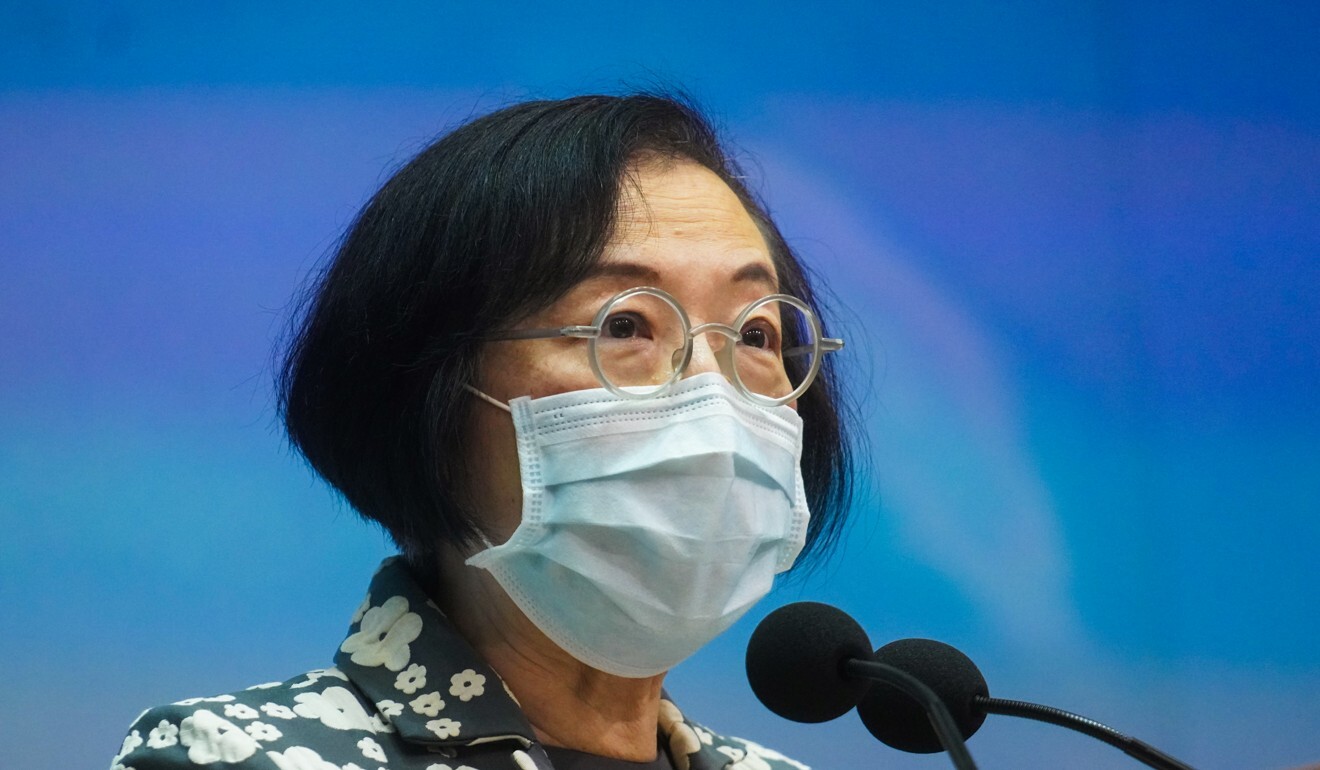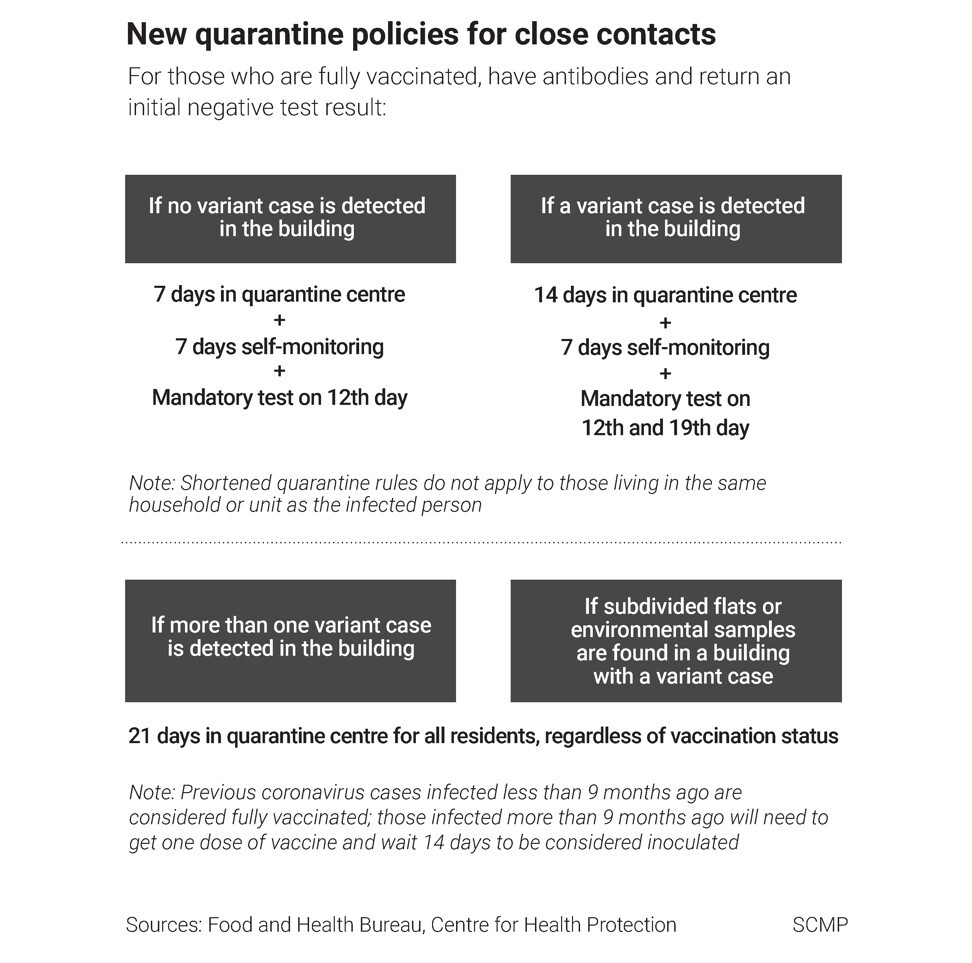
Coronavirus: Hong Kong health minister warns of heightened risk posed by variant strains, legal consequences for those who flout quarantine orders
- Secretary for Food and Health Sophia Chan says the threat posed by the emergence of more infectious variants must be taken seriously
- Referring to a recent dispute with some residents who were issued quarantine orders, Chan warns those who break the law will face legal action
Secretary for Food and Health Professor Sophia Chan Siu-chee on Sunday said the threat posed by the emergence of more infectious variants must be taken seriously, even as the city confirmed another case of a mutant strain brought in from overseas.
While Hong Kong had no new local case of Covid-19 to report for a second straight day, the variant infection was detected in a 52-year-old woman who flew in from Argentina, taking the city’s overall total to 11,807 cases, with 210 related deaths.
Quarantine release for about 2,000 residents as Hong Kong eases Covid-19 rules
The city has recorded 262 cases of variant infections so far, most of them imported. The first two variant cases found locally in Hong Kong were confirmed last month, and their possible transmission links with three foreign domestic helpers and others have raised fears of a wider community spread.
“We will keep a close eye on the situation,” Chan said on a television programme. “If there is an unknown source for new variant cases, we won’t rule out adjusting the current Covid-19 control measures.”
Referring to a recent dispute when some residents of the Royalton I private housing estate in Pok Fu Lam refused to go into quarantine after a variant infection was found in their building, Chan warned that those who broke the law in the middle of a public health emergency would face legal consequences.
“There is a legal basis for every quarantine order. In the fight against the pandemic, everyone is equal so I hope people will cooperate,” she said.
“There will be legal consequences for those who don’t [cooperate] … The law enforcement officers are now following up on their cases.”

Residents quarantined recently over variant scares continued to return home in batches on Sunday after testing negative for Covid-19.
Tsuen Wan district councillor Chiu Yan-loy and Eastern district councillor Derek Ngai Chi-ho posted Facebook messages saying arrangements had been made for residents of Allway Gardens, Block R in Tsuen Wan and Kornhill, Block N in Quarry Bay to leave quarantine centres they had been sent to.
Chiu told the Post that residents mostly complained about “terrible food”, with more than 30 people coming down with diarrhoea at the Penny’s Bay quarantine camp.
Ngai said updates on the arrangements were not timely enough.
“Questions were left unanswered until the very last minute,” he said. “Luckily a WhatsApp group was set up so the residents could keep each other informed. At least there’s a sense of hope when you hear someone has received a notice telling them to pack up in preparation to leave.”
In a policy change announced on Friday, residents of buildings with variant infections do not have to serve 21 days of quarantine as initially required, but they will have to be tested four times over a period of self-monitoring.
However, those living in the same household as an infected person, or a subdivided flat, will have to undergo full quarantine.
Under the revised rules, close contacts who have received both doses of a vaccine at least 14 days earlier – and are not linked with patients carrying variants – will be sent to a quarantine centre for seven days before they are allowed to go home for one week of self-monitoring. They are also required to be tested on the 12th day.
Close contacts of variant cases will be quarantined for 14 days, rather than 21, in government facilities. They will also have to self-monitor for seven days after two weeks of quarantine and take a test on the 19th day.
“We think that the newly adjusted measures are appropriate as they were rolled out after our well thought-out consultation with the experts, taking into account the latest infection data and the epidemic situation. The existing variant cases were traceable with an identifiable source,” Chan said.
She also raised the prospect of close contacts of patients undergoing mandatory quarantine at home in the event of a surge of infections.
“So far we have sufficient quarantine facilities, such as about 5,000 units in quarantine centres and also others in quarantine hotels,” she said. “But we will closely monitor the situation. If there are larger outbreaks which require putting more close contacts into quarantine, we need to put in place some backup plans … There might be a chance of home quarantine.”
Repeating her vaccination appeals to the public, she said: “It could help achieve herd immunity so our lives could go back to normal quickly and we could gradually relax the restriction measures.”
From Wednesday, mandatory quarantine for vaccinated inbound passengers will be shortened according to the risk classification of countries in their recent travel history.
Under the relaxed rules, fully inoculated people who arrive from low-risk countries, such as Australia, New Zealand and Singapore, will only have to undergo seven days of hotel quarantine and another week of self-monitoring instead of the current two weeks’ isolation in a designated hotel.
Dr Gabriel Choi Kin, president of the Hong Kong Medical Association, warned that achieving herd immunity would not eliminate the threat from variant infections.
“Even with herd immunity through vaccination, variants hold a knife over our heads if border controls are not well kept and surveillance and follow-up are inadequate,” he told government radio.
Noting that trust in the government was key in determining whether the public was willing to get vaccinated, he said incentives under various schemes were not attractive enough.
The government is allowing vaccinated Hongkongers to eat at restaurants in bigger groups and for longer periods, visit bars or nightclubs, and serve shorter quarantine periods after travelling.
“Unfortunately, the schemes are complicated and not tempting enough to lure citizens to get vaccinated,” he said.
More than 280,000 foreign domestic workers had undergone mandatory testing by Friday, while over 50,000 had booked slots over the weekend, according to official figures.
Authorities on April 30 ordered all 370,000 of the city’s foreign domestic helpers to get screened by this Sunday in response to the emergence of coronavirus variants.



